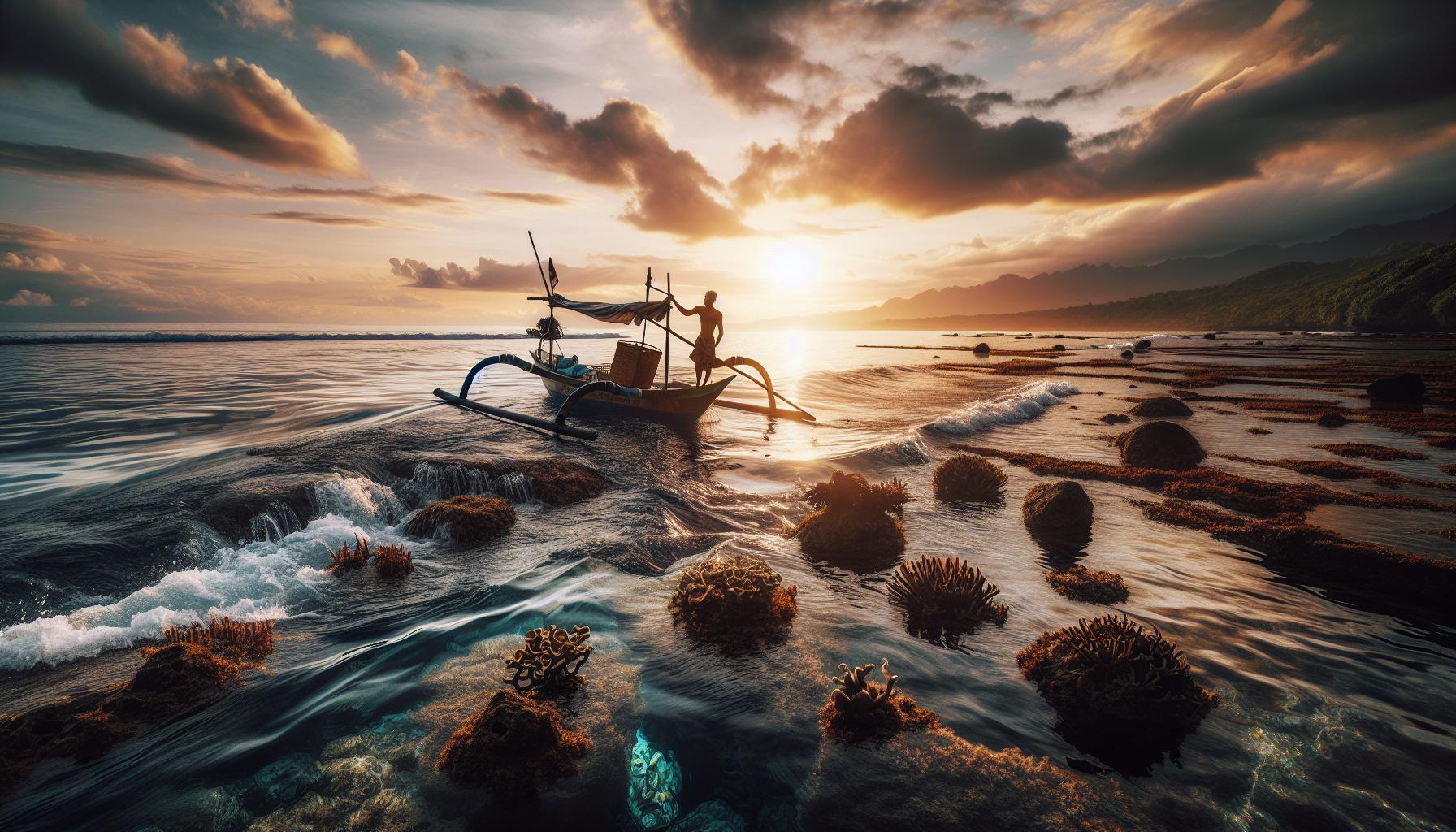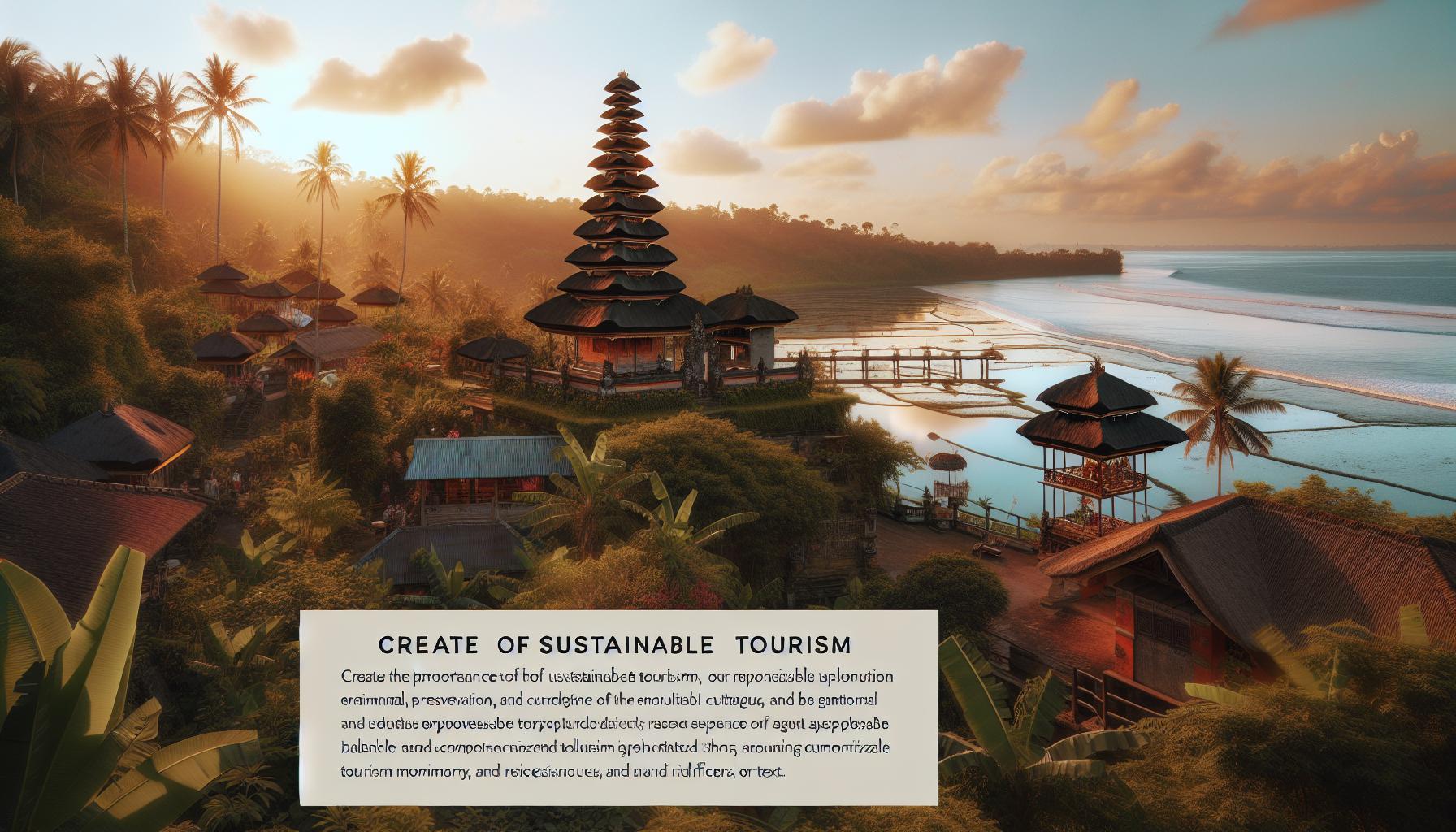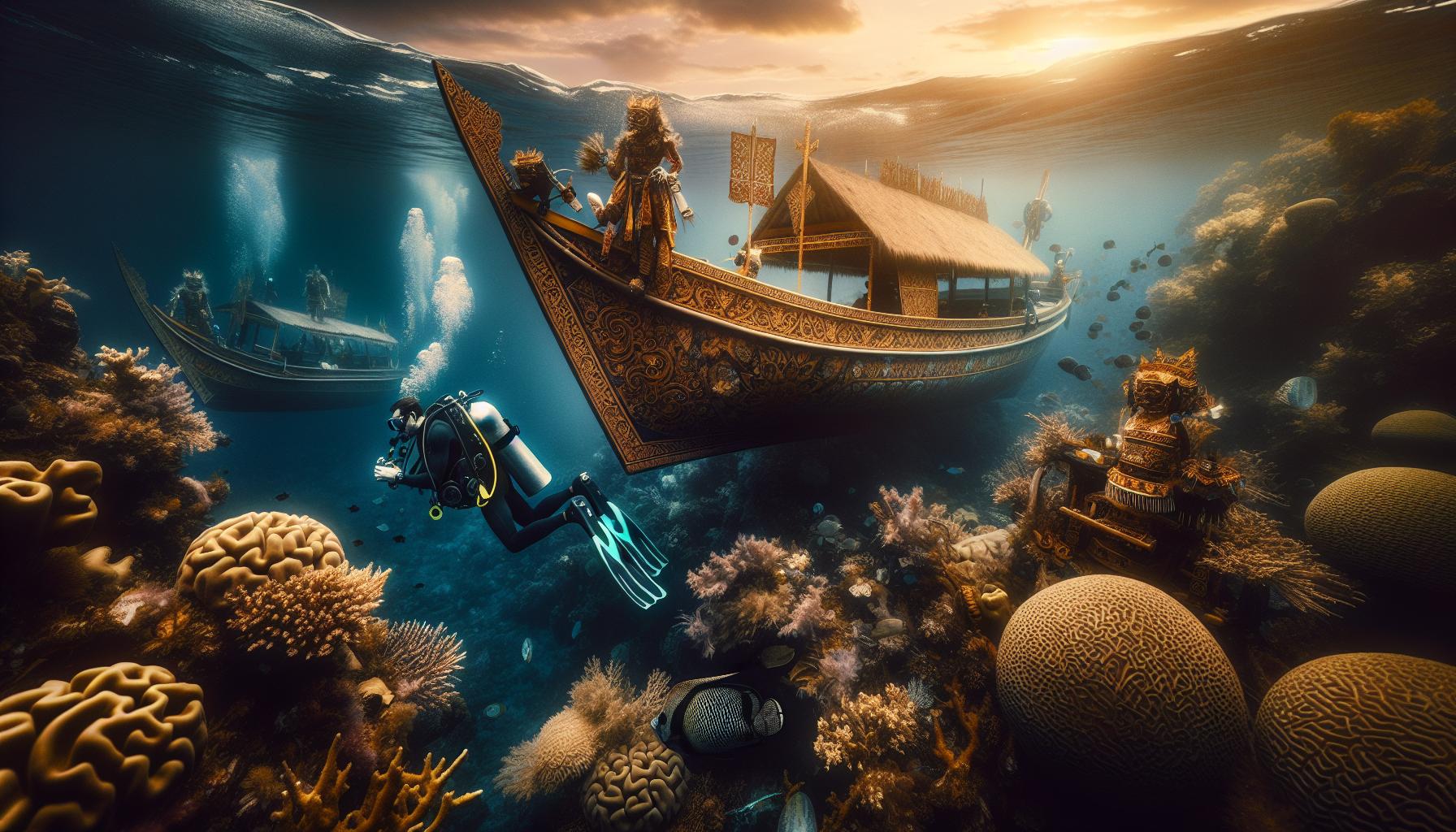Bali’s breathtaking underwater landscapes face increasing threats from tourism and environmental neglect, raising the urgent question: how can divers enjoy this paradise while safeguarding its marine ecosystems? Embracing enduring diving practices not only preserves coral reefs but also enriches the traveler’s experiance, ensuring that future generations can appreciate Bali’s natural beauty.
Understanding the Delicate Ecosystem of Bali’s Marine Life
Unveiling Bali’s Breathtaking Marine Biodiversity
Bali lies at the heart of the Coral Triangle, one of the most biologically diverse marine regions on the planet. With more than 1,200 species of marine life and over 393 species of coral identified in its vibrant waters,Bali offers a unique opportunity for divers to witness the delicate balance of its underwater ecosystem. This rich biodiversity is not only crucial for the health of the planet but also for the livelihoods of local communities dependent on fishing and tourism.
The Intricate Web of Coral Reefs
Coral reefs serve as the foundation of Bali’s marine ecosystem, offering shelter and sustenance for countless organisms.The island’s reefs support a variety of coral species, including both soft corals and hard corals, making them critical habitats for marine biodiversity.Key species such as reef fish and reef sharks thrive in these intricate structures. Furthermore, healthy coral reefs contribute to coastal protection and recreational opportunities that drive sustainable tourism.
Understanding the Impact of Human Activity
Though, this delicate ecosystem faces numerous challenges, predominantly from human activity. Overfishing, pollution, and climate change are detrimental forces that threaten marine life.As part of the initiative for Bali diving and sustainable travel, divers and tourists are encouraged to adopt responsible practices. Here are a few actionable steps to help protect this precious environment:
- Participate in local conservation efforts, such as reef clean-up drives.
- Avoid touching or stepping on corals while diving.
- Choose eco-kind dive operators that prioritize sustainability.
- be mindful of your waste and its potential impact on the ocean.
Practical Examples of Conservation Efforts
Many organizations on the island are actively involved in marine conservation. For instance, efforts to create marine protected areas (MPAs) have proven effective in enabling fish populations to recover and coral reefs to thrive. By recognizing the importance of these ecosystems, both locals and visitors can contribute to preserving the beauty and biodiversity that make Bali an exceptional diving destination.
The Importance of Sustainable Tourism in Bali
The Necessity of Sustainable Tourism in Bali
Imagine exploring Bali’s stunning underwater landscapes, teeming with vibrant coral reefs and diverse marine life, while contributing to the protection of these precious ecosystems. Sustainable tourism in Bali is vital not only for preserving its breathtaking natural beauty but also for ensuring the well-being of the local communities that thrive in this tropical paradise. As the popularity of Bali as a travel destination continues to rise, so does the need for responsible travel practices that minimize environmental impacts and promote cultural recognition.
By embracing sustainable practices, tourists can actively participate in initiatives that protect Bali’s rich biodiversity. Projects such as the Blue Project by AquaMarine Diving highlight this commitment by enhancing eco-friendly tourism operations. As Indonesia’s first Project AWARE GO eco Operator, AquaMarine not only offers unforgettable diving experiences but also champions the cause of marine conservation. Tourists who choose to engage with such organizations support local efforts to combat environmental degradation while enriching their travel experiences with meaningful connections to the location [[1]].
Moreover, the integration of eco-friendly accommodations and activities promotes a more sustainable form of travel. initiatives like socialbnb allow visitors to stay in local eco-resorts, where a portion of the proceeds goes toward marine life protection and conservation efforts. by choosing these options, travelers contribute to the livelihoods of local families while ensuring that their enjoyment of Bali’s pristine beaches and coral reefs does not come at an ecological cost [[2]].
For any traveler hoping to explore Bali’s natural wonders, it’s important to adopt a mindset of responsible tourism.This can be reflected in simple actions, such as:
- Participating in local conservation programs and clean-up days.
- Choosing eco-friendly operators for diving and other activities.
- Supporting local artisans and businesses that practice sustainability.
By aligning their travel choices with sustainable practices, visitors can enjoy the unique beauty of Bali while leaving a positive impact, ensuring that this island paradise remains a viable destination for future generations.
Top Diving Spots in Bali: Where to Explore Responsibly
Discovering the Wonders Beneath the Waves
Bali is renowned for its stunning underwater landscapes and diverse marine life, making it a premier destination for divers seeking both adventure and environmental consciousness. The island’s vibrant coral reefs and unique ecosystems are not only a paradise for underwater enthusiasts but also a crucial habitat that requires sustainable practices from visitors. Exploring Bali diving responsibly ensures that these natural treasures are preserved for future generations.
Top Diving Spots to Explore Responsibly
While diving in Bali, consider these remarkable spots that prioritize sustainability:
- Crystal Bay: Famous for its clear waters and the chance to see the majestic Mola Mola (sunfish), Crystal Bay is a must-visit.Choose operators that participate in local conservation efforts to protect the delicate ecosystem.
- Turtle Island (Penyu): A sanctuary for green sea turtles,this site allows divers to experience the beauty of marine life while contributing to its conservation. Look for eco-friendly dive schools that offer guided tours focused on educating divers about marine protection.
- Menjangan Island: Known for its stunning reefs and calm waters,Menjangan is perfect for both novice and experienced divers. Support local initiatives that promote sustainable tourism and habitat restoration efforts.
- Padang Bai: This location offers a variety of dive sites, from coral gardens to wreck dives, providing unforgettable experiences. Opt for dive shops that engage in regular clean-up dives and marine education programs.
| Diving Spot | key Features | Sustainability practices |
|---|---|---|
| Crystal Bay | Clear waters, Mola Mola sightings | Operators focused on conservation efforts |
| Turtle Island | Green sea turtle sanctuary | Eco-friendly tours and education |
| Menjangan Island | Stunning reefs, calm waters | Support local habitat restoration |
| Padang Bai | Coral gardens, wreck dives | Participates in clean-up dives |
By choosing to dive at these remarkable locations and supporting responsible diving practices, you can enjoy the breathtaking beauty of Bali’s underwater world while making a positive impact on its preservation. Whether you’re a seasoned diver or a beginner, embracing sustainability is key to ensuring that Bali’s marine treasures continue to thrive.
Eco-Friendly Dive Operators: Making the Right Choice
Choosing Eco-Friendly Dive Operators
When exploring the breathtaking underwater landscapes of Bali, selecting eco-friendly dive operators is crucial for preserving this unique marine ecosystem. Operators that practice sustainable diving not only provide unforgettable experiences but also contribute to the conservation of marine life. By minimizing environmental impact, these dive centers enable visitors to enjoy the natural beauty of bali while ensuring that these wonders remain intact for future generations.
Here are some key attributes to look for in eco-friendly dive operators:
- PADI Eco Dive centers: These centers follow specific guidelines set by PADI to promote sustainable diving practices.
- Green Fins Membership: Being a member of Green fins indicates a commitment to reducing environmental impact, following eco-friendly practices, and educating divers on conservation.
- Conservation Initiatives: Look for operators that participate in or support marine conservation projects, such as coral restoration or clean-up efforts.
- Eco-friendly Equipment: Ensure that the dive operator uses sustainable equipment, avoiding items that contribute to pollution, such as single-use plastics or harsh chemicals.
Dive centers like Intrinity Divers, as an example, prioritize the protection of marine life by enforcing strict no-touch policies, promoting responsible diving behaviour, and educating guests on the significance of coral reefs and marine ecosystems. Similarly, Ceningan Divers offers eco-conscious diving experiences in Nusa Penida, emphasizing sustainable practices throughout their operations.
To make the best choice for your diving adventure while supporting bali’s commitment to sustainable travel, consider researching and verifying the practices of dive operators before booking. This approach not only enriches your diving experience but also ensures that you play a part in preserving the stunning underwater paradise that Bali is known for.
Practical Tips for Mindful Diving in Bali
Immerse Yourself Mindfully in Bali’s Underwater Wonders
Diving in Bali offers breathtaking encounters with vibrant marine life, but as stewards of the ocean, divers must prioritize sustainability to protect this paradise for future generations. By integrating eco-conscious practices into your diving routine, you can help preserve the delicate ecosystems while enjoying the underwater beauty that Bali has to offer.
Choose Eco-Friendly Dive Operators
Before you embark on your underwater adventure,research dive operators that prioritize sustainable practices. Look for those who are part of eco-certification programs or organizations focused on marine conservation. Many operators are now adopting measures such as minimizing plastic use, employing reef-safe products, and contributing to local conservation projects. To get started,consider operators who participate in initiatives such as reef clean-ups or educational programs about ocean conservation.
Practice responsible Diving Techniques
Enhancing your diving skills to minimize your impact on the environment is crucial when exploring Bali’s unique dive sites. Here are some practical techniques to adopt:
- Maintain Buoyancy: Improving your buoyancy control prevents accidental contact with fragile corals and marine life.
- Observe, Don’t Touch: Avoid touching or disturbing marine creatures. Many species are sensitive to human interaction, and touching can harm both the creature and the ecosystem.
- Avoid Finning in Fragile areas: When diving over delicate areas, consider using a backwards kick or other techniques to avoid damaging the substrate.
Reduce Your Environmental Footprint
Your choices on land can make a meaningful difference in reducing your underwater impact. When planning your trip to Bali, consider the following actionable steps:
- Opt for Sustainable Accommodations: Choose lodgings that practice sustainability by using renewable energy, reducing waste, and conserving water.
- Limit Plastic Use: Bring your reusable water bottle and refuse single-use plastics. This simple change helps keep Bali’s waters cleaner.
- Participate in Local Conservation Efforts: Engaging in beach clean-ups or workshops not only enhances your experience but also contributes to the community and the environment.
By taking these mindful actions, you not only enhance your own diving experience but also contribute positively to Bali’s marine ecosystems, making your adventures under the sea a truly responsible and rewarding endeavor.
Engaging with Local Communities: A Path to Responsible travel
Building Meaningful Connections
Traveling to Bali offers more than just breathtaking underwater experiences; it opens a gateway to engage with local communities,enriching both your journey and the lives of those you meet. When you choose to dive responsibly in Bali, consider how your activities can empower local people. For example, supporting community-based tourism initiatives allows you to immerse yourself in the culture while ensuring that your presence contributes positively to the local economy. This not only enhances your adventure but also helps preserve the unique traditions of Balinese culture.
Support Sustainable Practices
Engaging with local communities often means embracing sustainable practices that prioritize the environment and social equity. When planning your Bali diving trip, opt for tour operators that demonstrate a commitment to conservation and community welfare. Here are some actionable steps you can take:
- Choose Eco-Friendly Operators: Research companies that utilize sustainable diving equipment and practices.
- Participate in Local Workshops: Join community-led projects, such as coral reef restoration or traditional craft workshops, to support local artisans.
- Contribute to Conservation Efforts: Allocate a portion of your travel budget to initiatives working to protect marine ecosystems.
Create Positive Impact
Your visit can create a ripple affect of benefits for the local community. By consciously spending at local markets or dining at family-run restaurants, you can help distribute the economic benefits of tourism more equitably. Moreover, consider the impact of social interactions.Take the time to learn a few words in Bahasa Indonesia; this small gesture can lead to warm connections and a more authentic experience.
| Action | Benefit |
|---|---|
| Choosing local guides | Supports local livelihoods and enhances your understanding of the area. |
| Engaging in cultural exchanges | Promotes mutual respect and understanding between travelers and locals. |
| Participating in conservation programs | Directly contributes to the sustainability of the gorgeous Bali environment. |
Fostering these connections while diving in Bali is not just beneficial; it’s essential for sustainable travel. By investing your time and resources into local communities, you’re not only preserving the stunning surroundings but also ensuring future generations can explore paradise responsibly.
The Role of Conservation in Bali’s Diving Experience
The Importance of conservation in Bali’s Diving Experience
Bali’s underwater ecosystem is not just a tropical paradise; it is indeed a delicate web of life that requires concerted efforts to protect and sustain.With coral reefs being the foundation of marine biodiversity,conservation plays a pivotal role in the diving experience,allowing enthusiasts to witness thriving ecosystems rather than bleached,lifeless expanses.Engaging in responsible diving not only enhances the adventure but also contributes to the longevity of these natural wonders.
Conservation efforts, such as those implemented by local organizations, offer divers the chance to participate in hands-on activities that support marine sustainability.As a notable example, programs like those run by Bali Conservation Diving focus on coral reef restoration work that empowers local communities,fostering a sense of stewardship for the environment. Through activities like coral planting and marine monitoring, divers can directly contribute to preserving Bali’s unique ecosystems while enjoying the vibrant marine life that attracts divers from around the world.
Actionable Steps for Divers
Divers can take several steps to enhance their contribution to conservation while exploring Bali’s aquatic realms:
- Choose Eco-friendly Operators: Select diving operators that are committed to sustainable practices, such as The mighty Roar, which focuses on marine life data collection and education.
- Participate in Local Projects: Get involved in local conservation projects that offer diving programs designed to protect and restore coral reefs.
- Educate Yourself: Before diving, learn about the specific marine life and coral structures in the area to promote awareness, which enhances appreciation and encourages mindful interaction.
In addition to contributing to the preservation of Bali’s remarkable underwater life, responsible diving practices foster a deeper understanding and appreciation among divers. By prioritizing environmental conservation, divers not only enhance their personal experiences but also help safeguard the breathtaking beauty of Bali’s underwater landscapes for future generations. This holistic approach to diving and sustainable travel ensures that every plunge into the embrace of Bali’s waters is both an adventure and an act of preservation.
Reducing Your Carbon Footprint While Exploring paradise
Make Your Travel More Sustainable
Did you know that the transportation sector is responsible for about 70% of the total travel carbon emissions? This staggering figure highlights the importance of making conscious choices that contribute to a more sustainable environment while you dive into the wonders of Bali. Bali Diving and Sustainable Travel emphasizes eco-friendly practices that can help you reduce your carbon footprint and explore paradise responsibly.
- Choose Direct Flights: Whenever possible, opt for direct flights to your destination. This can substantially reduce your carbon emissions. Layovers not only extend travel time but also result in additional fuel consumption.
- Consider Option Transportation: For shorter distances, consider using trains or local buses instead of planes. Not only is this more sustainable, but it also allows you to experience more of Bali’s culture and scenery.
- Carbon Offsetting: Look for airlines that provide the option to offset your carbon emissions. Investing in projects that reduce carbon in the atmosphere can help balance your travel impact.
- Support Eco-Conscious Accommodations: When planning your stay, seek out hotels and lodges that implement sustainable practices. This could mean anything from using renewable energy sources to minimizing waste.
Engage with the Local Environment
By immersing yourself in Bali’s breathtaking marine life through diving, you have a unique opportunity to contribute to conservation efforts. Consider participating in beach clean-ups or coral restoration projects during your stay.Not only do these activities help the local ecosystem, but they also allow you to connect meaningfully with the community and fellow eco-conscious travelers.
| Eco-Friendly Practices | Description |
|---|---|
| Direct Flights | Reduce travel emissions by selecting non-stop routes. |
| Local Transport | Use buses,motorbikes,or bicycles for short distances. |
| Carbon Offset Programs | Invest in environmental projects to counterbalance your travel footprint. |
| Sustainable Lodgings | Look for hotels with green certifications. |
By integrating these practices into your itinerary, you can enjoy the stunning underwater landscapes of Bali while ensuring that your travel leaves a positive impact on the environment. Embrace the spirit of Bali Diving and Sustainable Travel: Explore Paradise Responsibly and set an example for future travelers.
How to Capture the Beauty of Bali’s Underwater World Ethically
Discovering the Depths with Care
Bali’s underwater world is not just a feast for the eyes; it is a delicate ecosystem that thrives beneath the waves. To truly embrace and capture its beauty, you must approach your dives with a spirit of respect and obligation. Ethical diving practices are pivotal to ensuring that the vibrant marine life and stunning coral reefs remain unharmed, allowing future generations to experience the same breathtaking sights.
When planning your underwater adventure, consider these key principles:
- Research Local Guidelines: Familiarize yourself with the regulations and best practices for diving in bali. Local laws often specify important rules,such as the prohibition of solo diving without a licensed guide to ensure safety and compliance. Ignoring these regulations can jeopardize both your safety and the local environment.
- Choose Eco-Friendly Operators: Select dive operators who prioritize sustainability and ethical practices. Look for companies that participate in coral restoration efforts or contribute to marine conservation initiatives.
- Minimize Your Impact: Practice “leave no trace” principles. be cautious with your buoyancy control to avoid damaging coral. Avoid touching marine creatures, as this can cause stress and harm to their natural behaviors.
- Educate Yourself: Learning about the species you may encounter can enhance your diving experience while fostering a deeper appreciation for marine life. Consider taking a marine ecology course or attending briefings offered by dive shops.
Capturing the Moment responsibly
When it comes to photography, combining your love for underwater beauty with responsible practices is essential. Always use camera equipment that is suited for underwater use and refrain from using flash photography,which can startle marine animals. focus on composition rather than getting too close to subjects, which helps maintain a respectful distance from wildlife.
Creating a stunning underwater portfolio that reflects the integrity of Bali’s marine ecosystems requires patience and a thoughtful approach. Capture images that tell a story about conservation, such as before-and-after shots of reef restoration projects, or portraits of marine life in their natural habitats. these photos can serve as powerful advocacy tools that promote sustainable travel and diving practices within the bali diving community.
By following these ethical guidelines,you can enjoy a fulfilling diving experience while actively contributing to the preservation of Bali’s stunning underwater landscapes. Each respectful interaction reinforces the importance of sustainability in this paradise and encourages others to do the same.
In Conclusion
As we conclude our exploration of Bali diving and sustainable travel, it’s clear that this tropical paradise offers not only breathtaking underwater experiences but also a commitment to preserving its natural beauty. by choosing eco-friendly dive resorts like Ceningan Divers, you support practices aimed at minimizing carbon footprints and protecting local ecosystems [[1]](https://ceningandivers.com/sustainable-travel-how-we-can-offset-our-carbon-emissions/sustainable-travel/). Engaging in responsible tourism activities,such as clean-up dives with organizations like Legend Diving,not only enriches your adventure but also contributes directly to the conservation of the vibrant marine life of Nusa Lembongan and Penida [[2]](https://divinglembongan.com/clean-up-dive-bali-how-legend-diving-protects-our-local-marine-treasures/).
Bali’s eco-tourism efforts reveal the beauty of traveling with purpose, ensuring that future generations can also experience the unique charm of this island [[3]](https://warriorsdivine.com/blogs/the-path/bali-s-eco-tourism-traveling-with-purpose?srsltid=AfmBOorv9GtOEyLvVhQd6EtFHSzUzUsVNz-q-PT8KxZOPKzUprCq2wNb). We encourage you to continue your journey into sustainable practices, enriching your travels while making a positive impact. Explore, engage, and enjoy Bali—responsibly!






